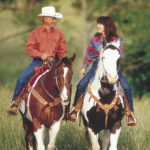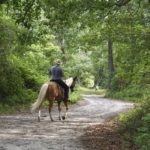Physical Benefits of Ownership
There are many benefits to involvement with horses, for people of all ages. Equine activities may encourage physical activity, for people of varying abilities. For example, simply walking out to a barn, grooming a horse, lifting a saddle and riding may provide more physical activity than many people typically get, especially in our era of computers, television and more sedentary lifestyles. For those who don’t want to ride, grooming a horse, cleaning stalls or feeding may also encourage physical activity. When people decide that they?d like to improve their riding skills, they may be inspired to begin a non-horse related conditioning program as well.

When supervised by certified instructors, riders with disabilities may have the chance to safely perform physical activities with the horse as a tool. Early research is showing that riding a horse may provide physical benefits for people with disabilities. At the same time, interacting with horses may provide mental benefits as well.
Mental/Emotional/Social Benefits of Horse Ownership
There are a variety of mental benefits to equine activities, and we are at the edge of a frontier of scientific research to actually quantify those benefits. In the past several years, professional organizations have formed to share the advantages of equine assisted activities with regard to mental health. At first glance, however, most people involved with horse are instinctively aware that there are social benefits, and that horses provide an outlet for stress reduction, mood improvement and that equine activities may provide a type of therapy much different from traditional means.
Social Benefits
For people living alone, simply interacting with another living thing provides a tremendous motivator and social benefit. Often, as people get involved with equine activities, they gravitate toward people with similar interests. There are literally thousands of clubs across the country that allow people to come together to enjoy their animals and preferred activities. For more information on these groups which serve the interests of people of all ages, contact your state Horse Council.
Stress Reduction
Recent studies utilizing dogs and dolphins have shown that even limited interaction with the animals may provide a decrease in blood pressure and in the hormones associated with stress reactions. In our busy world, having an outlet to manage day-to day stress can only be beneficial and for many, horses provide that outlet. Physical exercise is a scientifically recognized mediator of stress and it is clear that equine activities may provide exercise, again highlighting the potential for equine activities to reduce stress. Research has also shown that regular meditation may reduce stress indicators such as blood pressure, heart rate and stress hormone levels. While research investigating the role of horses in stress reduction still needs to be done, there is a meditative quality to grooming or working with a horse that may provide a similar benefit to meditation.
Mood Improvement
Most parents of teenage girls recognize that if their daughters are in a bad mood, interaction with a horse will often improve that mood. While research investigating the interaction between horses and mood improvement is ongoing at Michigan State University, early indicators are that there is in fact an improvement in Mood Inventory Scores of teenage girls after 15 minutes of quiet interaction with a horse. There is no reason to believe that the same would not be true in adults as well.

The Impact of Horses on Youth
Recent?surveys conducted by both the American Youth Horse Council and Penn State University have found that equine activities develop life skills such as decision making, communicating, problem solving, goal setting and empathy. In the AYHC Study, a significant positive relationship was found between total horsemanship skills development and life skills development.
Karen Waite is an Equine Extension Specialist in Michigan and teaches and advises Equine students in the MSU Department of Animal Science. In her Extension roles she coordinates the Adult Equine Extension program, the Michigan Equine Survey, and is the Director of Leadership Development for My Horse University.






